15 Human Foods That Are Surprisingly Good For Your Pup
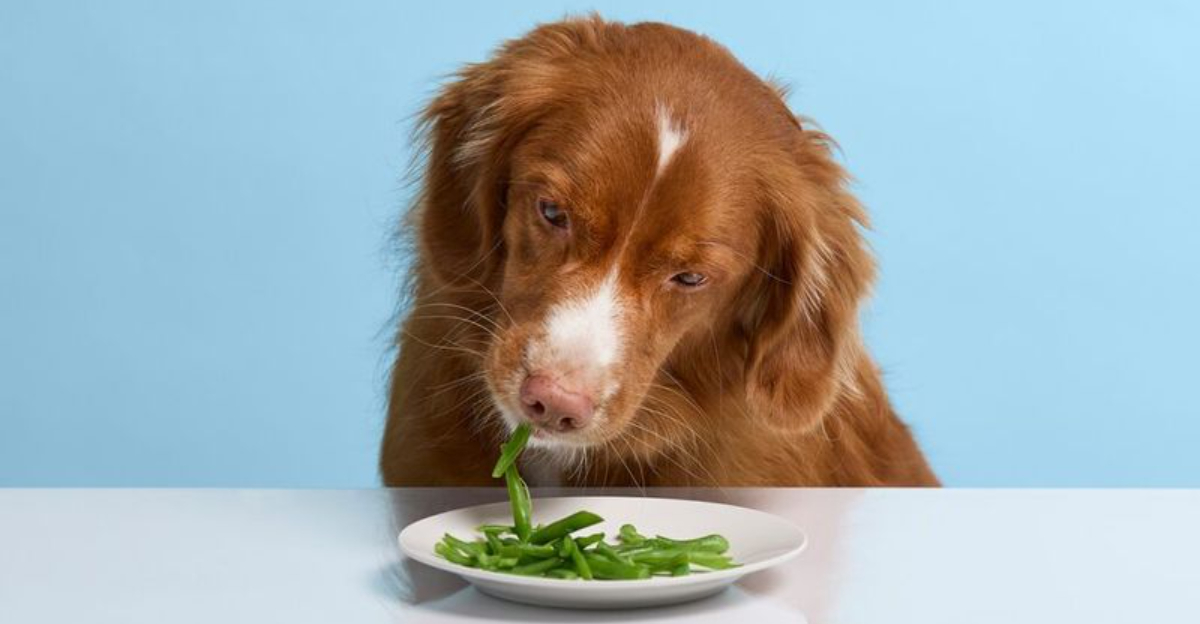
Ever wondered if your furry friend can share some of your favorite snacks? While many human foods are off-limits for dogs, there are plenty that can actually boost your pup’s health.
These nutritious options can supplement your dog’s regular diet with extra vitamins, minerals, and antioxidants. The next time you’re in the kitchen, consider treating your four-legged companion to these safe, healthy human foods.
1. Peanut Butter Paradise

Unsalted, unsweetened peanut butter makes a protein-packed treat that most dogs absolutely adore. The healthy fats and protein help maintain your pup’s coat and muscle development. Just be careful to check the label first!
Make sure it doesn’t contain xylitol, an artificial sweetener that’s toxic to dogs. Spread a small amount on a toy or mix it with their regular food for a special surprise. Moderation is key – peanut butter is calorie-dense, so limit this creamy delight to occasional treats.
2. Crunchy Carrot Snacks

Raw carrots offer dogs a satisfying crunch while providing beta-carotene and fiber. Their natural sweetness appeals to many pups, making them an excellent low-calorie alternative to commercial treats. The chewing action even helps clean your dog’s teeth!
Try freezing carrot sticks for a refreshing summer treat that helps soothe teething puppies. For senior dogs or those with dental issues, steamed and cooled carrots provide the same nutrients in a softer package. Most dogs can safely enjoy carrots daily as part of a balanced diet.
3. Yogurt Protein Boost
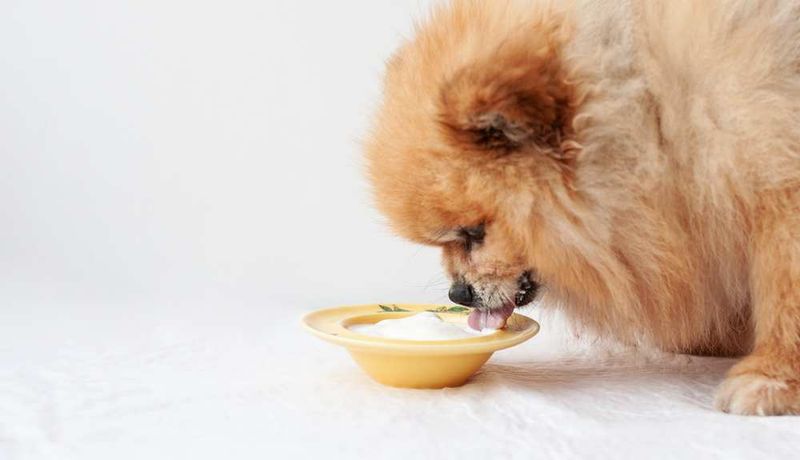
Plain, unsweetened yogurt provides calcium, protein, and beneficial probiotics that support your dog’s digestive health. The creamy texture makes it a hit with most pups, especially on hot days. Active cultures in yogurt can help balance gut bacteria and improve overall immune function.
Serve a spoonful as an occasional treat or mix it with their regular food. Greek yogurt offers even more protein with less lactose, making it ideal for dogs with sensitive stomachs. Avoid yogurts containing artificial sweeteners, especially xylitol, which is toxic to dogs.
4. Blueberry Antioxidant Bombs
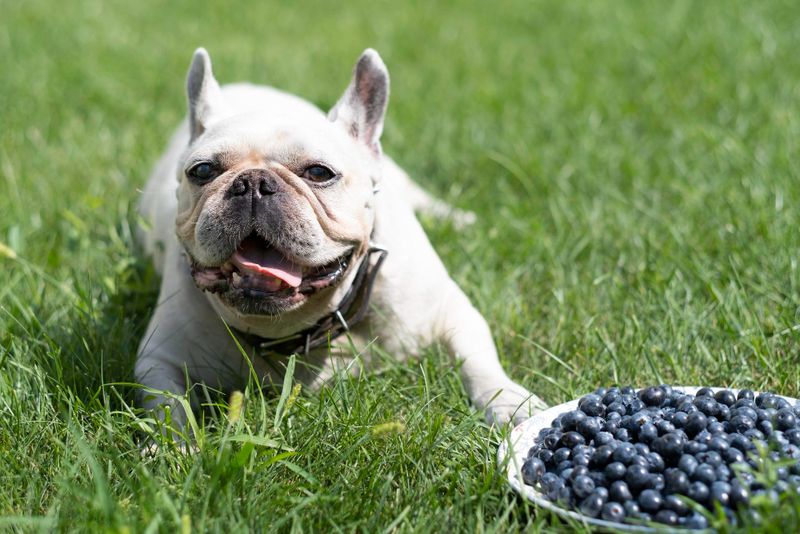
These tiny berries pack a powerful nutritional punch for your pup. Loaded with antioxidants, vitamin C, and fiber, blueberries help fight free radicals and support your dog’s immune system. Their small size makes them perfect training treats that won’t pile on extra pounds.
Fresh or frozen, most dogs love the sweet taste and interesting texture. Try freezing them for a refreshing summer treat that helps cool your dog down. The natural sugars provide a quick energy boost without the crash that comes from processed treats.
5. Sweet Potato Power

Cooked sweet potatoes deliver a nutritional powerhouse of vitamin A, vitamin C, and fiber to your furry friend. The natural sweetness appeals to dogs while the complex carbohydrates provide sustained energy without blood sugar spikes. Their bright orange color comes from beta-carotene, which supports eye health and immune function.
Serve them cooled and mashed or as dehydrated chew strips for a longer-lasting treat. Never feed raw sweet potatoes, as they’re difficult to digest. Baked or steamed sweet potato chunks make excellent training rewards that are both healthy and satisfying.
6. Egg-cellent Protein Source
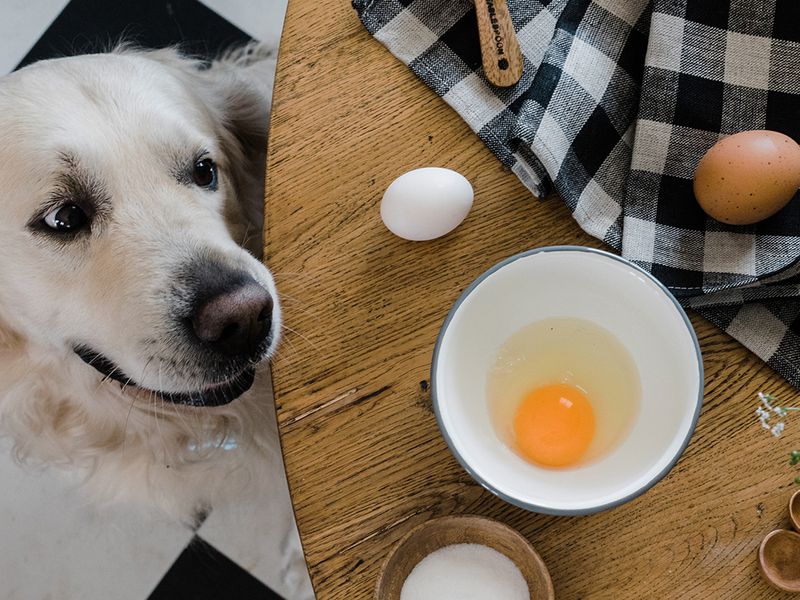
Cooked eggs provide a complete protein package that’s easily digestible for most dogs. The amino acids in eggs support muscle development, while biotin and fatty acids promote healthy skin and coat. A scrambled egg occasionally mixed into your dog’s food can help a picky eater clean their bowl.
Always serve eggs fully cooked without seasonings or oils. Raw eggs pose salmonella risks and contain an enzyme that can interfere with biotin absorption. For smaller dogs, a quarter of an egg is plenty, while larger breeds might enjoy half an egg as an occasional protein boost.
7. Pumpkin Digestive Helper

Plain canned pumpkin (not pie filling) is a miracle worker for canine digestive issues. Its high fiber content helps regulate bowel movements, whether your pup is dealing with diarrhea or constipation. The beta-carotene also supports eye health and immune function.
A tablespoon mixed with regular food can soothe an upset tummy and provide a tasty change of pace. Pumpkin’s low calorie count makes it ideal for weight management while still giving your dog something satisfying. Freeze tablespoon portions in ice cube trays for easy serving and to extend shelf life.
8. Apple Crunchy Treats

Fresh apple slices provide a sweet, crunchy treat that cleans teeth while delivering vitamins A and C. The fiber in apples supports digestive health and helps your dog feel full between meals. Most pups love the juicy crunch and naturally sweet flavor.
Always remove the seeds and core before serving, as apple seeds contain small amounts of cyanide. Refrigerated apple slices can soothe teething puppies’ gums. For an extra-special treat, spread a tiny amount of dog-safe peanut butter on apple slices for a combination most dogs find irresistible.
9. Salmon Omega Boost

Cooked salmon delivers omega-3 fatty acids that support skin health, reduce inflammation, and give your dog’s coat that enviable shine. These essential fats also support brain development in puppies and cognitive function in senior dogs. The high-quality protein helps maintain muscle mass as your dog ages.
Always serve thoroughly cooked, plain salmon without seasonings, oils, or bones. A small portion once or twice a week is plenty – about a tablespoon for small dogs and up to a quarter cup for larger breeds. Canned salmon (packed in water, not oil) provides the same benefits in a more affordable, convenient form.
10. Green Bean Crunch
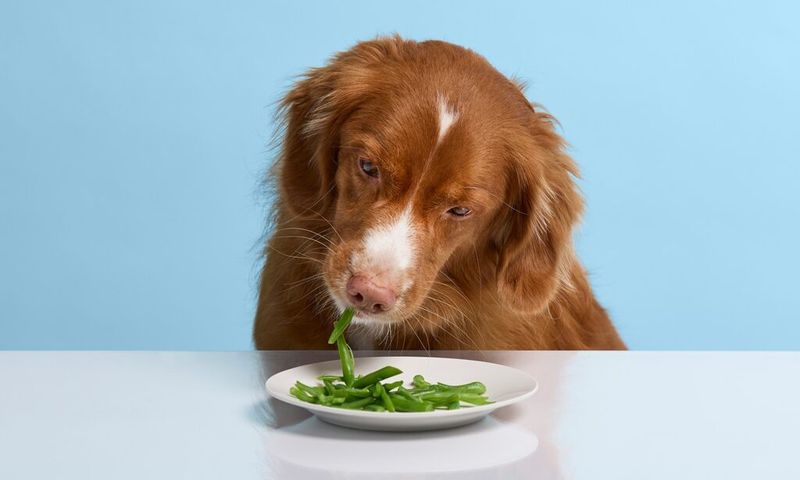
Fresh or frozen green beans make excellent low-calorie snacks that satisfy your dog’s craving to chew. They’re packed with vitamins K and C while being extremely low in calories – perfect for pups watching their waistlines. Many veterinarians recommend green beans as part of a weight management plan.
Serve them raw, steamed, or frozen depending on your dog’s preference. Cut longer beans into bite-sized pieces for smaller dogs to prevent choking hazards. Canned green beans can work too, but choose low-sodium or no-salt-added varieties to keep your pup’s sodium intake in check.
11. Oatmeal Morning Warmth

Plain cooked oatmeal provides soluble fiber and nutrients that benefit dogs, especially seniors with digestive sensitivity. The complex carbohydrates offer sustained energy without the spike and crash of processed treats. For dogs with wheat allergies, oatmeal offers a gentle alternative grain.
Always serve cooked and cooled, without sugar or flavorings. A tablespoon or two mixed with regular food makes breakfast special. The B vitamins in oatmeal help maintain a healthy coat, while the linoleic acid supports skin health. Cook oatmeal with water rather than milk to avoid potential digestive upset.
12. Cucumber Hydration Helpers

Cucumber slices offer a refreshing, hydrating snack with almost no calories – perfect for hot days or dogs on diets. The high water content helps keep your pup hydrated while the crunchy texture satisfies their desire to chew. Many dogs enjoy the mild flavor and satisfying crunch.
Remove the seeds for easier digestion, especially for smaller breeds. Refrigerated cucumber slices can help cool down an overheated dog after exercise. The phytonutrients in cucumbers provide anti-inflammatory benefits, while the minimal calorie content makes them ideal for frequent treating without weight gain.
13. Watermelon Summer Refresher
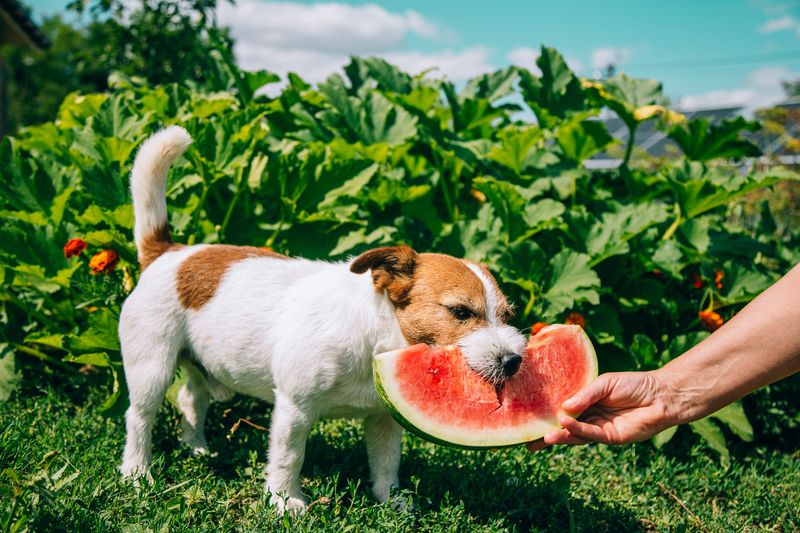
Seedless watermelon chunks provide hydration and vitamins A, B6, and C in a naturally sweet package that most dogs adore. The high water content makes watermelon perfect for hot summer days when your pup needs extra hydration. The lycopene in this fruit provides antioxidant benefits that support overall health.
Always remove seeds and rind before serving, as these can cause intestinal blockage or upset. Frozen watermelon chunks make refreshing treats during hot weather. The natural sugars provide a quick energy boost without the artificial ingredients found in many commercial treats.
14. Lean Turkey Protein
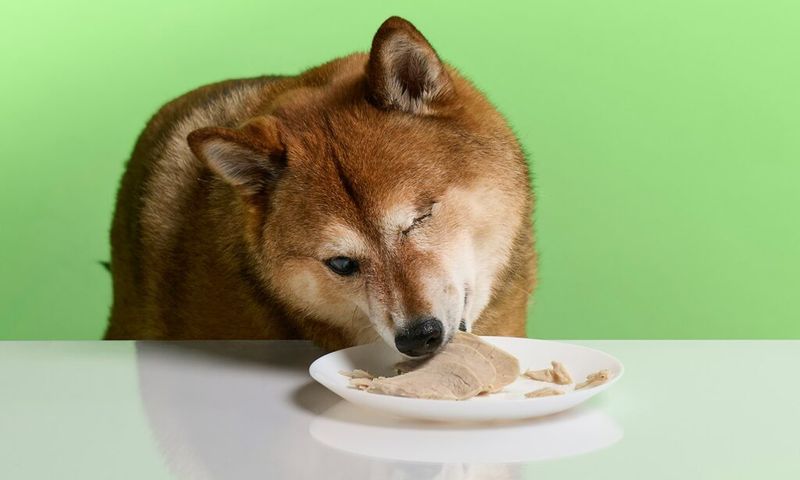
Plain cooked turkey breast offers lean protein that’s gentle on sensitive stomachs while supporting muscle development. Without skin, bones, or seasonings, turkey provides essential amino acids with minimal fat. Many dogs with food sensitivities can tolerate turkey when other proteins cause reactions.
Shred or cube small amounts to mix with regular food or use as high-value training treats. The tryptophan in turkey can have a calming effect, making it a good choice before stressful events. Avoid processed turkey products like deli meat, which contain harmful sodium and preservatives.
15. Banana Potassium Boost

Sliced bananas deliver potassium, vitamin B6, and vitamin C in a naturally sweet package that many dogs eagerly accept. The soft texture makes bananas perfect for senior dogs or those with dental issues. They’re also easily digestible for most pups with sensitive stomachs.
Serve in small slices as occasional treats – a few inches of banana is plenty for most dogs. Frozen banana slices provide cooling relief during hot weather or for teething puppies. For a special treat, mash a small amount of banana into your dog’s regular food or stuff some into a Kong toy.






